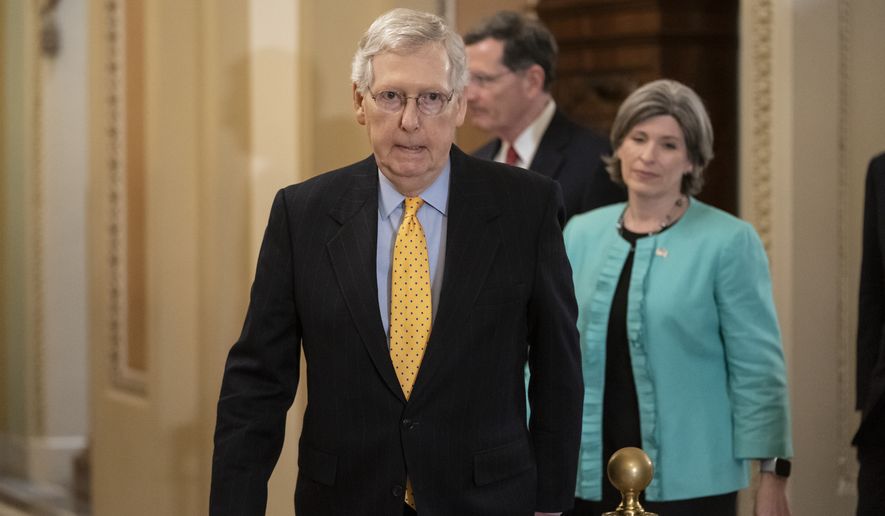The Senate’s top Republican and the House’s top Democrat each said Thursday that they’re open to a broad immigration debate this year, sending the issue soaring back to the top of the congressional agenda.
Senate Majority Leader Mitch McConnell told reporters he’s willing to talk about a broader legalization if it means Republicans can win stiffer border security and changes to current laws that serve as enticements for the surge of migrants overwhelming the border.
“I think it’s way past time for us to have an adult bipartisan discussion about our immigration laws and see what we can agree to,” he said.
Asked whether that means he would entertain the broad “comprehensive immigration reform” approach Democrats say is necessary, Mr. McConnell signaled an openness.
“I’m willing to enter into a negotiation to see what we can do to fix the problems,” he said.
His comments came just hours after House Speaker Nancy Pelosi said she’s looking to tackle the thorny issue.
Speaking Thursday morning at Democrats’ policy retreat, she said she regularly asks President Trump to take up the issue.
“We cannot continue with a situation where we have 11 million people craving a path to citizenship, craving a path to being here legally and just continue to ignore it,” she said.
Both leaders were talking about their plans for their respective chambers as this Congress nears the 100-day mark, and as lawmakers headed home for a two-week spring break. When they return they’ll have a three-month stretch before their summer vacation — and that period is usually when the heaviest lifting occurs.
Both Mr. McConnell and Mrs. Pelosi said infrastructure is a possible area of bipartisan cooperation, but huge hurdles remain there.
Mrs. Pelosi envisioned a nearly $2 trillion package, though she waved aside how to come up with that cash. But without that, Mr. McConnell said, nothing’s going to happen.
“Everybody loves infrastructure in the abstract. The real issue is how you’re going to pay for it,” he said. “The only thing I’d rule out is we’re not going to do another $900 billion stimulus which, remember, was done in the first year of the Obama administration … other than a few Solyndra loans it was pretty hard to see what came of it.”
Rank-and-file Democrats did suggest some ways to pay for their plans, such as a high-speed transit fee or repealing parts of Republicans’ 2017 tax cuts, but there’s no unified party stance.
Senate Minority Leader Charles E. Schumer told reporters Thursday that he and Mrs. Pelosi are set to meet with President Trump on infrastructure in “the next several weeks.”
“The bottom line is this: If they’re not going to put real money and real environmental protections we’re not going to get anywhere,” he added.
While broad health care legislation isn’t likely to clear Congress, all sides said a narrower bill aimed at lowering prescription drug prices could.
“Republicans and Democrats have got to deliver on lower prescription drug prices period,” Rep. Debbie Dingell, Michigan Democrat, told reporters. “Or everybody is in trouble next year.”
But it was enthusiasm for another immigration debate that was the surprise of the 2019 agenda talk Thursday.
The Senate has passed broad legalization bills in 2006 and 2013, and tried but failed in 2007. None of those were taken up in the House.
Instead, the House passed a similar Dream Act in 2010, but it was rejected in a GOP-led filibuster in the Senate.
Mr. McConnell voted for the 2006 reform but has opposed the others. Mrs. Pelosi ducked the immigration debate during her previous tenure as speaker from 2007 to 2010, other than moving the Dream Act bill that died in the Senate.
Mr. McConnell has chided Democrats for failing to act when they had complete control of the levers of power with President Obama and a Democratic Congress in 2009 and 2010. Mrs. Pelosi on Thursday said she sees a chance now.
“It’s complicated, but it isn’t hard to do if you have good intentions,” she said.
Any deal will require President Trump to be on board, but that could be complicated by the other side of Democrats’ 2019 agenda: investigations.
Even as party leaders say they’re focused on legislating, rank-and-file members and key chairmen have opened myriad probes into the president and his administration.
“I don’t think we have a choice but to do both,” said Rep. David Cicilline, Rhode Island Democrat. “I think there’s a way that you can conduct oversight that may be less threatening and uses less bombastic rhetoric but I think the fundamental work needs to be done.”
• Stephen Dinan can be reached at sdinan@washingtontimes.com.
• Gabriella Muñoz can be reached at gmunoz@washingtontimes.com.




Please read our comment policy before commenting.